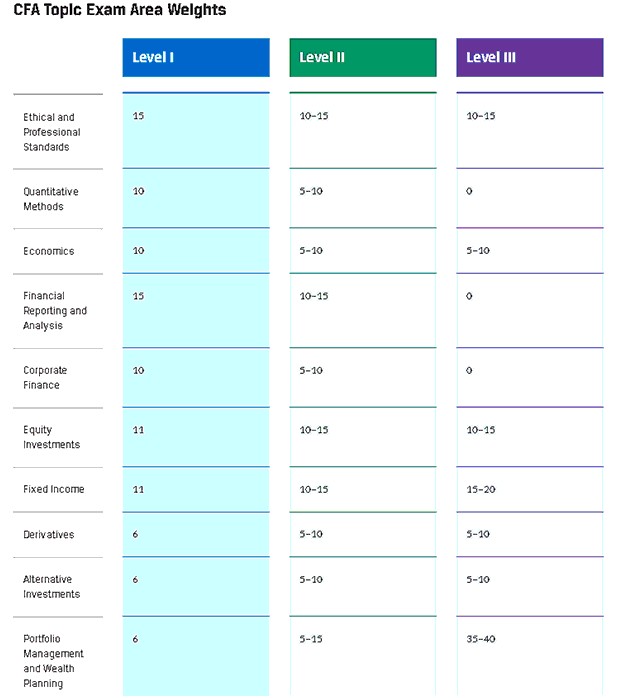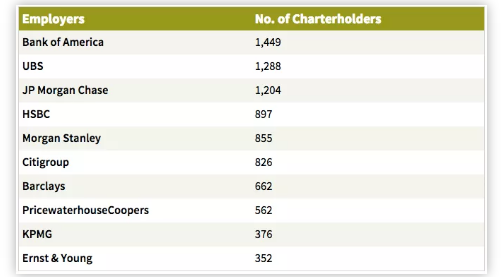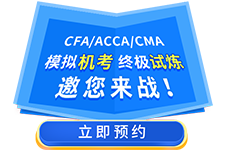每一年考试CFA协会都会对考纲进行修改,今年也不例外。相比2019年考纲,CFA在考试大纲上又有新动作,2020年CFA考纲发生大变化,难度再次加大,很多科目都有所更换。

相较过往而言,2020年的CFA一级考纲整体变化幅度较小,主要是各项细节调整,具体调整如下:
CFA一级考纲变化
01伦理道德与专业准则
Reading 1. Ethics And Trust In The Investment Profession中,新增考纲:
c. describe professions and how they establish trust;
取消对framework for ethical decision making的应用(apply)要求。
02
数量方法
删除整个Reading. Discounted Cash Flow Applications
Reading 7. Statistical Concepts and Market Returns中,19相比18年考纲取消对夏普比率(Sharpe ratio)的计算和解释要求。
Reading 11. Hypothesis Testing中,新增考纲:
k.formulate a test of the hypothesis that the population correlation coefficient equals zero and determine whether the hypothesis is rejected at a given level of significance;
原Reading 13. Technical Analysis 整体移动到组合管理(Portfolio Management)部分。
03
公司财报分析
Reading 20. Financial Reporting Standards中,删除原考纲要求:
c. describe the status of global convergence of accounting standards and ongoing barriers to developing one universally accepted set of financial reporting standards;
f. compare key concepts of financial reporting standards under IFRS and US generally accepted accounting principles (US GAAP) reporting systems;
g. identify characteristics of a coherent financial reporting framework and the barriers to creating such a framework;
i. analyze company disclosures of significant accounting policies.
取消财报准则设置机构的描述、对国际证监会组织的角色描述、财报的目标描述、财报的前提准备等要求。
Reading 21. Understanding Income Statements中,删除原考纲要求:
b. accrual accounting, specific revenue recognition applications (including accounting for long-term contracts, installment sales, barter transactions, gross and net reporting of revenue), and implications of revenue recognition principles for financial analysis;
d. describe key aspects of the converged accounting standards for revenue recognition issued by the International Accounting Standards Board and Financial Accounting Standards Board in May 2014;
Reading 26. Long-lived Assets中,删除原考纲要求:
o. explain and evaluate how leasing rather than purchasing assets affects financial statements and ratios;
p. explain and evaluate how finance leases and operating leases affect financial statements and ratios from the perspective of both the lessor and the lessee.
Reading 30. Non-current (Long-term) Liabilities中,删除原考纲要求:
h. determine the initial recognition, initial measurement, and subsequent measurement of finance leases;
i. compare the disclosures relating to finance and operating leases。
04
公司金融
Reading 32. Capital Budgeting中,新增考纲:
f.contrast the NPV decision rule to the IRR decision rule and identify problems associated with the IRR rule。
05
固定收益投资
Reading 44. Introduction to Fixed-Income Valuation中,新增考纲:
f.calculate annual yield on a bond for varying compounding periods in a year。
06
衍生工具
Reading 48. Derivative Markets and Instruments中,新增考纲:
d.determine the value at expiration and profit from a long or a short position in a call or put option;
Reading 49. Basics of Derivative Pricing and Valuation中,新增考纲:
c. calculate a forward price of an asset with zero, positive, or negative net cost of carry;
删除原考纲:i . explain how the value of a European option is determined at expiration。
07
投资组合
该部分整体移动到其他类投资之后:
Reading 51. Portfolio Management: An Overview中,新增考纲:
b.describe the steps in the portfolio management process;
Reading 52. Portfolio Risk and Return: Part I中,新增考纲:
b. compare the money-weighted and time-weighted rates of return and evaluate the performance of portfolios based on these measures
Reading 54. Basics of Portfolio Planning and Construction中,新增考纲:
h.describe how environmental, social, and governance (ESG) considerations may be integrated into portfolio planning and construction.
CFA二级考纲变化
相较于2019年,2020年CFA二级考纲半数以上科目实质变化较大。首先,相较于2019年,各科目的考试权重不变。
其次,考纲内容上,除了财务报表分析(Financial Reporting Analysis)、权益投资(Equity Investments)、其他类投资(Alternative Investments)、固定收益投资(Fixed Income Investments)四门科目考纲要求无变化,其余科目的考纲都有不同程度的内容调整。单科科目的考纲要求变化情况具体如下:
01 伦理与职业标准
删除两个章节:
Reading 4 Trade Allocation: Fair Dealing and Disclosure;
Reading 5 Changing Investment Objectives。
02 数量方法
Reading 4 Introduction to Linear Regression中,删除关于相关分析的考纲要求:
a. calculate and interpret a sample covariance and a sample correlation coefficient and interpret a scatter plot;
b. describe limitations to correlation analysis;
c. formulate a test of the hypothesis that the population correlation coefficient equals zero and determine whether the hypothesis is rejected at a given level of significance;
Reading 5 Multiple Regression,删除关于机器学习的三条原考纲要求:
p.distinguish between supervised and unsupervised machine learning;
q.describe machine learning algorithms used in prediction, classification, clustering, and dimension reduction;
r.describe the steps in model training;
新增Reading 7 Machine Learning;
新增Reading 8 Big Data Project。
03 经济学
Reading 12 Economics of Regulation中,关于评估行业监管的影响的考纲要求描述有所修改:
i. describe the considerations when evaluating the effects of regulation on an industry.
04 公司金融
删除Reading 23 Corporate Performance, Governance, and Business Ethics;
删除Reading 24 Corporate Governance;
新增Reading 22 Corporate Governance and Other ESG Considerations in Investment Analysis。
05 衍生工具
删除Reading 41Derivatives Strategies。
06 投资组合管理
删除两个章节:
Reading 46 The Portfolio Management Process and The Investment Policy Statement;
Reading 51 Algorithmic Trading and High-Frequency Trading。
新增两个章节:
Reading 43 Exchange-Traded Funds: Mechanics and Applications;
Reading 48 Trading Costs and Electronic Markets,新考纲要求来源于:
2019年CFA三级科目Trading and rebalancing相关章节;
2019年CFA二级投资组合管理(Portfolio Management)Reading 51;
Algorithmic Trading and High-Frequency Trading。
CFA三级考纲变化
相对于2019年,2020年CFA三级考纲的变化较显著,以往过时的内容已全部删除,代之以对当前全球金融界*研究成果进行系统介绍的新内容,综合阅读量进一步加大,Reading数量从2019年37个增加到38个,对考生学习能力的要求进一步提高。2020年版的新教程更加注重对考生投资专业性和系统性的培养,对职业素养的要求更高。具体而言,*显著的变化体现为如下方面:
新增道德与职业准则(2)(Session 2:Ethical and Professional Standards (2))模块:
保留原模块实践中的道德和职业准则(Session2:Ethical and Professional Standards in Practice)的章节内容;
原全球投资业绩标准(Session 20:Global Investment Performance Standards)内容全部移动至该模块,新章节为Reading 6 Overview of the Global Investment Performance Standards。
删除原资产管理行业与专业性(Session 3:The Asset Management Industry and Professionalism):
模块下原章节Reading 5 Overview of The Asset Management Industry and Portfolio Management删除;
原章节Reading 6 Professionalism in Investment Management移动至道德与职业准则(2)(Session 2:Ethical and Professional Standards (2))模块。
新增资本市场预期(Session 4:Capital Market Expectations)模块:
将原模块Session 8:Applications of Economic Analysis to Portfolio Management中的章节Reading 16 Capital Market Expectations移动至该模块,并进行大幅修改,更新为Reading 10 Capital Market Expectations, Part1:Framework and Macro Considerations;
新增Reading 11 Capital Market Expectations, Part 2: Forecasting Asset Class Returns。
新增投资组合管理中的资产配置和相关决策(Session 5:Asset Allocation and Related Decisions in Portfolio Management):
由原模块Session 9:Asset Allocation And Related Decisions In Portfolio Management (1)和Session 10:Asset Allocation And Related Decisions In Portfolio Management (2)合并;
由三个章节构成,Reading 12 Overview of Asset Allocation;Reading 13 Principles of Asset Allocation和Reading 14 Asset Allocation With Real-World Constraints,章节内容基本无变化。
新增衍生品及现金管理(Session 6:Derivatives and Currency Management):
将原模块Session 17 Risk Management Applications of Derivatives移入该模块,并进行大量修改,新章节为Reading 15 Options Strategies和Reading 16 Swaps, Forwards, And Futures Strategies;
将原模块Session 10 Asset Allocation And Related Decisions In Portfolio Management (2)下章节Reading 21 Currency Management: An Introduction移入该模块,新章节为Reading 17 Currency Management: An Introduction,内容基本无变化。
另类投资(Session11:Alternative Investments For Portfolio Management)模块进行大幅修改:
将原章节Reading 30 Alternative Investments Portfolio Management删除,变更为两个新章节Reading 26 Hedge Fund Strategies和Reading 27 Asset Allocation to Alternative Investments。
私人财富管理(1)(Session12:Private Wealth Management (1))模块,删除原章节Reading10 Managing Individual Investor Portfolios,新增章节Reading 28 Overview Of Private Wealth Management。
机构投资者的投资组合管理(Session14:Portfolio Management for Institutional Investors)模块内容大幅修改:
原章节Reading 15 Managing Institutional Investor Portfolios删除,新章节为Reading 33 Portfolio Management for Institutional Investors。
新增交易、绩效评估和基金经理选择(Session 15 Trading, Performance Evaluation, and Manager Selection)模块:
由原Session 18 Trading和Session 19 Performance Evaluation合并,并进行了大幅修改,新章节为Reading 34 Trade Strategy and Execution,Reading 35 Portfolio Performance Evaluation和Reading 36 Investment Manager Selection。
新增投资组合管理与风险管理案例(Session 16:Cases in Portfolio Management and Risk Management)模块,新增两个案例学习章节Reading 37 Case Study In Portfolio Management: Institutional和Reading 38 Case Study In Risk Management: Private Wealth。
如今,CFA考试变得越来越难,通过率逐年降低,我们不禁要问到底要不要放弃呢?CFA证书到底值得考吗?目前,国内对CFA持证人大量稀缺,只要获得了这个证书,你就能在金融投资领域脱颖而出,拿下证书,你将能够在金融领域获得更多细分领域的发展。以下是各大金融投行内部CFA持证人数统计:

(数据来源于:CFA Institute)
距离2020年6月的CFA考试还有半年时间,同学们要抓紧时间备考。根据往年CFA考试的经验,职业道德标准、财务报表分析、投资工具和资产评估都在历年考试中占据着较大的比重,大家要着重复习。
本文章为学习相关信息展示文章,非课程及服务内容文章,产品及服务详情可咨询网站客服微信。
文章转载须注明来源,文章素材来源于网络,若侵权请与我们联系,我们将及时处理。











